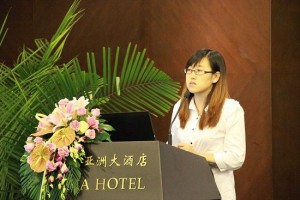Originally published by Huffington Post here.
With greenhouse gas emissions hitting record levels and passing climate scientist’s worst predictions, a new group of Chinese activists, traditionally silenced by an authoritarian government, is making its voice heard at the United Nations climate talks, the COP17, which began this week in Durban, South Africa.
China is the largest emitter of greenhouse gases in the world. With this unflattering superlative comes significant political pressure — from both the international community and China’s own population.
The delegation of independent Chinese non-governmental organizations (NGOs) believes that civil society must play a bigger role in the global climate crisis. According to one organizer, Dr. Yang Fuqiang from the Natural Resources Defense Council, “The world is paying attention to China, so the Chinese NGOs need to take action.”
C Plus is the name given to the initiative launched by 42 Chinese NGOs (full disclosure: my NGO, the Innovation Center for Energy and Transportation is a leading member) calling for domestic and global action to fight climate change. The NGOs who have lent themselves to this cause claim that the only way to create a fair, ambitious and legally-binding deal in Durban is to mobilize NGOs to put pressure on their governments to take action, another organizer, Jiliang Chen told me. “The best way of demanding governments’ action is to take actions by ourselves,” he said. The message is clear: climate action is too important and too urgent. It can’t wait. The top-down process of negotiations that we are seeing at the UN is too slow.

Li Xueyu from the Innovation Center for Energy and Transportation discusses carbon management at a recent conference in Beijing.
C Plus has three components, which together explain its name. C Plus stands for: Beyond Commitment. This means that NGOs must put pressure on their governments to achieve targets that are beyond those that have been officially stated. Second is Beyond China — in other words, NGOs outside and inside of China together must strive to influence their respective governments to take action. Finally, Beyond Climate. The initiative targets not just carbon reduction but other environmental measures as well such as clean water and air, public education, water conservation and preservation of forests.
The initiative was born out of the disappointment of the COP15 — the UN climate talks of 2009 in Copenhagen which bogged down over the degree of responsibility between developed and developing nations. The Chinese delegation largely held the view that, as a developing nation, it should be exempt from legally-binding international agreements constructed by the UN parties because it is more important that it grow its economy and lift people out of poverty than reduce greenhouse gas emissions. That task, they argued, should be left to the rich countries who, they claimed, created the problem in the first place.
However, the failure in Copenhagen galvanized NGOs to take actions with a new level of urgency. With headlines like “Climate change leads to extreme weather events: report” and “Scarcity of land, water pose severe challenge to mankind” and “Climate change threatens drop in grain harvest,” the case for immediate action is building in China. (This, even while the climate-denier position is gaining traction in especially the Republican quarters of American politics.)
With similar fault lines set to plague the talks in Durban, it will be interesting to see what role NGOs can play. In the last few years, NGOs have enjoyed increasing influence and visibility, especially after Chinese Climate Czar, Xie Zhenhua, praised NGOs last year for playing a “constructive role” in China’s climate policy.
And NGOs can claim some notable successes. As Chen reminded me, NGOs were responsible for the regulation which imposes the 26 degree Celsius cap on air conditioning units. They were instrumental in challenging the damming of the Nu River. A group of Chinese citizens organized together and stopped the construction of a dangerous paraxylene chemical plant in Xiamen.
“Sustainable development requires a paradigm shift of the society,” said Chen. “NGOs are such a small group, if they cannot work collectively, it is very unlikely that they could make the shift as they wish to see.” In Durban, Chinese NGOs have arrived as a team and are prepared to assert their demands.
Follow Lucia Green-Weiskel on Twitter: www.twitter.com/LuciaGGW

